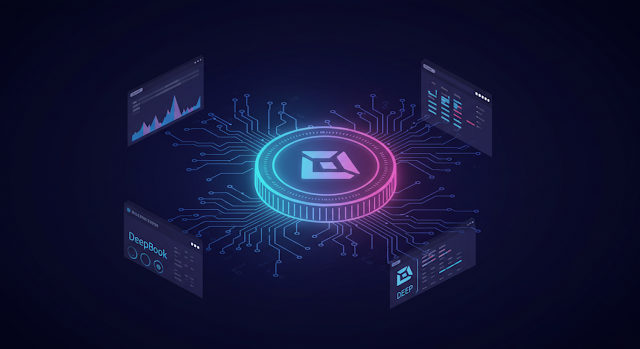Hey everyone! If you’ve been navigating the crypto market, you know it’s an ever-evolving landscape.
But even with all its ups and downs, one area continues to capture my imagination with its relentless innovation and potential: DeFi (Decentralized Finance). I’ve been spending a good amount of time lately exploring the DeFi space, especially as it seems to be buzzing with fresh energy, and I’m always on the hunt for those projects that could genuinely offer something unique. In this recent deep dive, one particular name kept popping up on my radar: DEEP coin.
So, I decided to really dig in and understand what DEEP coin and its home platform, DeepBook, are all about. I want to share my findings and thoughts with you today.
This isn’t just about listing features; I want to talk about why this project specifically caught my attention, what I think makes it stand out, and of course, what considerations any potential investor should keep in mind. If you’re like me, always curious about the new frontiers in DeFi, then I think you’ll find this interesting. Let’s get into it!
DEEP Coin: Unpacking the Buzz Around This Sui-Based Token
DEEP coin is the native cryptocurrency that powers a decentralized finance platform known as DeepBook. Now, with so many DeFi platforms out there, the first question is always, “What’s different here?” For me, the initial point of interest was discovering that DeepBook is built on the Sui blockchain.
Sui has been generating considerable excitement in the crypto community, and for good reason.
It’s designed for high-speed transactions, impressive efficiency, and, crucially for users, much lower transaction fees than many older blockchains.
You can think of it as a next-generation highway for crypto, aiming to eliminate those frustrating traffic jams (network congestion) and reduce the toll costs (gas fees). This kind of environment is a magnet for innovative developers and projects.
From a user’s standpoint, it means the promise of interacting with DeFi services more smoothly and affordably. DeepBook is built to harness these very strengths of the Sui network.
So, what’s DeepBook’s specialty? Many of us are familiar with centralized exchanges (CEXs) – think giants like Coinbase or Kraken – where the exchange itself is the central party managing all trade orders.
DeepBook charts a different course with its Decentralized Central Limit Order Book (D-CLOB) model. It sounds technical, but the core idea is pretty revolutionary.
Let me simplify that. The “decentralized” aspect means that your trades are executed via transparent smart contracts, open for anyone to verify, and you maintain custody of your assets.
No single company is pulling all the strings. The “central limit order book” part, however, means it operates with the same kind of order book you see on a traditional CEX.
Buyers list what they want to buy and at what price, sellers list what they want to sell and at what price, and the system automatically matches them. Why is this a big deal?
Many current Decentralized Exchanges (DEXs) utilize an Automated Market Maker (AMM) system. AMMs have been groundbreaking, but they can sometimes result in “slippage” – that frustrating gap between the price you thought you’d get and the price you actually got, especially with larger trades. D-CLOBs, like the one DeepBook implements, are designed to minimize this slippage and offer more precise pricing, particularly for substantial orders.
It’s aiming for that sweet spot: CEX-like trading efficiency combined with DEX-level transparency and user control. The DEEP token plays a vital role in keeping this order book liquid and the platform running effectively.
Let’s use a visit to a bustling marketplace as an analogy:
- An Order Book (CLOB) is like specific stalls where vendors post exact prices for their goods (e.g., “Apples: $1 each, 50 available”). You see all posted buy and sell offers and can choose or place your own specific order.
- An Automated Market Maker (AMM) is more like a community-managed stall where the price of apples dynamically adjusts based on an algorithm that balances the supply of apples against the demand from buyers at any given moment. It’s often user-friendly, but the price per apple might shift slightly as you buy, especially if you’re buying a large quantity.
DeepBook, with its D-CLOB model, is striving for that clear, listed-price efficiency and depth, common in traditional finance.
The DEEP Token: Is It Just Another Coin, or a Real Utility Player?
When I evaluate any altcoin, especially those not yet household names, my first question is always about its utility: “Does this token actually *do* anything, or is it just for speculation?” This is where my research into the DEEP token got particularly interesting.
It appears to be engineered with specific, tangible uses within the DeepBook ecosystem, aiming to be much more than just a tradable asset.
A primary function is incentivizing liquidity providers.
For an order book system like DeepBook to function effectively, it needs a healthy amount of liquidity – meaning, enough assets available for trading at various price points. Users can contribute to this by depositing their assets into DeepBook’s liquidity pools.
As a reward for strengthening the platform in this way, they can earn DEEP tokens. It’s a system designed to reward those who help the exchange operate smoothly. I also found mentions that staking DEEP tokens might offer users discounts on trading fees – a compelling perk for anyone planning to trade actively on DeepBook. This creates a potential feedback loop: more liquidity can lead to a more active platform, which in turn could enhance the utility and demand for the DEEP token.
The second key utility I identified is governance rights. In the spirit of true decentralization, the community should have a say. DEEP token holders are expected to be able to participate in key governance decisions for the DeepBook platform.
This could range from voting on proposals for new platform features, amendments to operational rules, or adjustments to the fee structure.
This empowers DEEP holders to be more than just investors; they can be active stakeholders helping to chart the platform’s future course. For me, this is a significant aspect, as it helps align the token holders’ interests with the platform’s long-term success.
Finally, DEEP tokens serve as a medium for paying transaction fees on the DeepBook platform.
When users execute trades or interact with other platform services, they can use DEEP tokens to cover the associated costs.
This naturally creates a consistent source of demand for the token. Considering these roles in liquidity, governance, and fee settlement, DEEP is positioned as an integral utility token, its value proposition closely tied to the real-world activity and growth of the DeepBook ecosystem, rather than just market sentiment alone.
Utility in Action: A Scenario 📝
Let’s imagine Alex, a DeFi enthusiast using DeepBook:
- Alex spots an opportunity to provide liquidity for a trading pair on DeepBook and starts earning DEEP tokens as a reward for his contribution.
- He decides to stake some of his accumulated DEEP tokens, which qualifies him for a reduction in trading fees, making his frequent trades more cost-effective.
- Later, a governance proposal is put forward to integrate a new analytical tool into the DeepBook interface. Alex uses his staked DEEP to vote in favor of this proposal.
- For his regular trading activities, Alex uses DEEP tokens to pay the platform fees.
In this example, Alex isn’t just passively holding DEEP; he’s leveraging its utility to enhance his trading, save on costs, and influence the platform’s direction. This kind of active use is what can underpin a token’s fundamental value.
DEEP Coin: Gauging Its Investment Potential – My Thoughts
Now, let’s turn to the question that’s often top of mind: what about DEEP coin as an investment? I want to be crystal clear: what follows are my personal observations and interpretations, and this is absolutely not financial advice.
Any investment decision should be the result of your own comprehensive research and tailored to your personal financial situation and risk appetite.
Looking at historical data from an earlier market phase (it’s crucial to remember that crypto prices are incredibly dynamic, and past performance is not indicative of future results), DEEP coin was seen trading at approximately $0.068.
It had shown a significant climb from a previous all-time low of around $0.01073, representing a more than 500% increase from that point.
Its recorded all-time high, at that time, was near $0.09383. This data suggested that while it had already achieved substantial growth from its bottom, there was still a gap to its previous peak, which some might interpret as potential for further upside, especially if compared to the very steep trajectories of some other altcoins during bull cycles. However, a rally of over 500% is a major move in itself and warrants careful consideration of entry points.
The market capitalization around that same period was in the neighborhood of $170 million.
In the broad DeFi landscape, this would typically classify it as a mid-cap project. A market cap in this range is interesting because it’s generally not so small as to be overly susceptible to manipulation by minor capital flows, nor so large that it requires monumental investment to see price appreciation.
This can mean it has the capacity to be agile and responsive to both broader market trends and specific project-related news. Again, I must stress that market cap figures are in constant flux, so always consult up-to-date sources for the latest numbers!
From my perspective, the aspect that lends a degree of cautious optimism to DEEP is its well-defined utility and its intrinsic link to the DeepBook platform’s potential success.
If DeepBook manages to attract a growing user base and significant trading volume, the demand for DEEP tokens – for liquidity rewards, fee payments, staking benefits, and governance – could logically increase. Should DeepBook successfully establish itself as a go-to D-CLOB decentralized exchange, particularly within the expanding Sui ecosystem, this progress would likely be reflected in the DEEP token’s valuation.
This approach, focusing on building fundamental value through utility, is often more sustainable than relying on short-lived hype. It’s this focus on fundamentals that, in my view, makes it a project worth keeping an eye on for the longer term.
| Key Aspect | DEEP Coin / DeepBook Feature | Potential Significance |
|---|---|---|
| Base Blockchain | Sui Network | Benefits from Sui’s speed, low fees, and scalability for DeFi. |
| Trading Model | Decentralized Central Limit Order Book (D-CLOB) | Targets CEX-level trading efficiency with DEX benefits; aims for reduced slippage. |
| Core Token Utility | Rewards for liquidity, staking benefits, governance, fee settlement. | Designed to create organic demand tied to platform use and expansion. |
| Market Cap (Historical Ref.) | ~$170 Million (during a past analysis period) | Mid-cap status suggests potential for responsiveness to news and market shifts. |
Mind the Current: Essential Risks to Evaluate Before Diving In
Now, it’s time for a healthy dose of caution. The crypto seas can be notoriously choppy, and no investment is without risk. DEEP coin, for all its interesting features, is no exception.
It’s vital to weigh these potential downsides carefully before considering any investment.
- Overall Market Volatility: This is a universal truth in crypto. The value of DEEP coin can, and likely will, experience significant swings influenced by Bitcoin’s price action, the general sentiment across the crypto market, and even wider economic events. Unforeseen negative news, regulatory crackdowns, or waves of FUD (Fear, Uncertainty, and Doubt) can also sharply impact prices.
- Fierce Competition & Technological Hurdles: DeepBook operates in a crowded and highly competitive DEX landscape. Many other projects are vying for users and liquidity, both on the Sui network and other blockchains. There’s no assurance that DeepBook will outmaneuver its competitors or achieve mass adoption. Additionally, smart contracts, the code that underpins DeFi platforms, are complex. While diligent projects undertake security audits, the risk of undiscovered bugs, vulnerabilities, or malicious hacks can never be entirely discounted.
- Reliance on the Sui Ecosystem: Given that DeepBook is built upon the Sui blockchain, its destiny is closely intertwined with the overall growth, stability, and adoption of the Sui ecosystem itself. If Sui encounters major technical setbacks, fails to attract a critical mass of users and developers, or loses momentum, DeepBook could suffer collateral damage, irrespective of its individual strengths.
In light of these (and other potential) risks, concentrating your entire investment portfolio into DEEP coin, or risking capital you cannot afford to lose, would be an unwise strategy. Diversification remains a cornerstone of prudent risk management in the crypto sphere. And paramount to all, commit to thorough Due Diligence (DYOR – Do Your Own Research!) before investing a single dollar into any project. Strive to understand the underlying technology, the credentials of the team, the intricacies of the tokenomics, and the competitive environment. My personal inclination for utility-centric tokens like DEEP, if I have conviction in the project and its ecosystem, leans towards a patient approach of accumulating modest positions over time, rather than making large, impulsive bets.
This Post in a Nutshell: Key Insights on DEEP Coin & DeepBook 📝
We’ve navigated a fair bit of information about DEEP coin and DeepBook! Here’s a quick recap of the core points I’ve explored:
- DEEP Coin Defined: It functions as the native utility token for DeepBook, a platform featuring a Decentralized Central Limit Order Book (D-CLOB) built on the Sui blockchain.
- The Sui Advantage: Leveraging the Sui network allows DeepBook to potentially offer faster, more efficient, and cheaper transactions, which is a boon for DeFi applications.
- DeepBook’s D-CLOB Proposition: This model seeks to blend the order book efficiency found in centralized exchanges with the transparency, self-custody, and permissionless nature of decentralized exchanges, potentially leading to better trade execution and reduced slippage.
- Utility of the DEEP Token: Its primary roles include rewarding liquidity providers, enabling staking for fee discounts, granting governance participation rights, and serving as a means to pay platform transaction fees. This design aims to create an intrinsic link between the token’s value and the platform’s operational success.
- Investment Angle: While past price performance (always to be viewed with caution) showed notable appreciation from earlier lows, its then mid-range market cap and strong utility focus presented an interesting long-term outlook, contingent on DeepBook achieving substantial adoption.
- Significant Risks to Heed: Potential investors must seriously consider factors like pervasive crypto market volatility, the highly competitive DEX sector, inherent technical risks (including smart contract security), and DeepBook’s reliance on the Sui ecosystem’s continued growth and stability.
DEEP Coin & DeepBook: At a Glance 📊
Token Name: DEEP Coin
Associated Platform: DeepBook
Host Blockchain: Sui Network
Platform’s Core Trading Mechanism: Decentralized Central Limit Order Book (D-CLOB)
Key Utilities of DEEP Token:
- Rewards for Liquidity Provision
- Staking for Potential Fee Reductions
- Platform Governance Rights
- Payment Method for Transaction Fees
Key Consideration: A utility-focused token whose potential is closely tied to the adoption and success of the DeepBook platform within the competitive Sui DeFi landscape. Standard cryptocurrency market risks apply.
Your Research Compass: Navigating Projects Like DEEP Coin
I genuinely cannot overstate this: the insights and observations I share are merely a starting point for your own journey of discovery.
If DEEP coin, or any other cryptocurrency project for that matter, captures your interest, the crucial next step is to put on your researcher’s hat and conduct your own thorough investigation (what we call DYOR – Do Your Own Research). But if you’re wondering where to even begin, here are some areas I typically focus on:
- Official Project Resources (Website & Whitepaper): These should be your first port of call. The project’s official website will provide an overview, while the whitepaper should offer in-depth details about the technology, objectives, tokenomics (the economics of the token, including its distribution and utility), and the project’s roadmap. Look for clarity, professionalism, and substance.
- The Team and Their Advisors: Investigate who is steering the ship. Are the team members’ identities public? What is their background and experience in relevant fields like blockchain technology, finance, or software engineering? While not always a definitive red flag, anonymous teams often warrant a higher degree of caution.
- Community Engagement & Communication: Explore their official community channels – typically platforms like Telegram, Discord, Twitter (X), and forums. How active and engaged is the community? How does the project team interact with its members? Are questions (even tough ones) addressed transparently?
- Tokenomics Deep Dive: Understand the token supply. How many tokens will ever exist? How are they allocated (e.g., to the team, for development, for community rewards)? Are there vesting schedules for tokens allocated to the team or early investors (this can prevent premature sell-offs)? What are the mechanisms for token inflation or deflation, if any?
- Technological Soundness & Security Audits: This is especially critical for DeFi projects. Has the platform’s smart contract code been audited by reputable, independent third-party security firms? Ideally, these audit reports should be publicly accessible for review.
- Roadmap Viability & Progress Tracking: Does the project have a clearly defined roadmap with realistic and measurable milestones? More importantly, is the team demonstrating progress and delivering on its stated goals?
- Independent Analysis & Third-Party Reviews: Seek out analyses from trusted cryptocurrency news outlets, reputable market analysts, or well-regarded researchers. However, always maintain a critical eye and be wary of “shills” – individuals who may be paid to promote a project without full disclosure. Cross-reference information from various independent sources to form a balanced view.
During your research, be extra cautious if you encounter:
- Explicit guarantees of unusually high or quick investment returns (legitimate crypto projects rarely, if ever, make such promises).
- A whitepaper that is vague, poorly written, or lacks technical substance.
- A completely anonymous team with no verifiable track record or credentials.
- Excessive marketing hype that seems disproportionate to the project’s actual development or utility.
- A consistent lack of transparency from the team or an unwillingness to address valid concerns from the community.
- For DeFi projects, a lack of evidence of thorough smart contract audits by credible security firms.
Frequently Asked Questions ❓
So, that’s my deep dive into DEEP coin and the DeepBook platform. From its foundations on the promising Sui blockchain to its attempt to refine DeFi trading with a D-CLOB model, and the clear utility built into the DEEP token, there are certainly aspects that sparked my curiosity.
The direct relationship between a token’s utility and the thriving of its native platform is a dynamic I always find compelling, potentially elevating DEEP beyond mere speculation and into a token that allows participation in an ecosystem’s evolution.
However – and I can’t reiterate this enough – any decision to engage with or invest in cryptocurrencies demands meticulous personal research and a very clear-eyed assessment of all potential risks. The insights and perspectives shared in this post are the product of my own analysis and are intended strictly for informational and educational purposes. They should never be construed as financial advice.
If DEEP coin, or indeed any other crypto project, has piqued your interest, I urge you to embark on your own comprehensive due diligence. Factor in current market conditions, your individual financial objectives, and your personal tolerance for risk before making any commitments. The cryptocurrency market is a domain of extraordinary innovation and opportunity, but it is equally characterized by significant volatility and risk.
The world of cryptocurrency is highly volatile and speculative. Prices can fluctuate dramatically and rapidly. The content provided in this blog post is for general informational and educational purposes only and does not constitute financial advice, investment advice, trading advice, or any other sort of advice. You should not treat any of the blog’s content as such. Always conduct your own thorough research and consult with a qualified financial professional before making any investment decisions. Past performance is not indicative of future results. Investing in cryptocurrencies carries a risk of loss, and you could lose some or all of your principal investment.
I hope this exploration has provided some valuable food for thought! What are your perspectives on D-CLOB platforms, or your experiences with the Sui ecosystem?
Have you encountered DEEP coin or DeepBook in your own crypto journeys? I’d be very interested to hear your opinions, insights, or any questions you might have in the comments section below.
Let’s foster a learning community! Until we connect next time, may your research be fruitful and your strategies sound!









